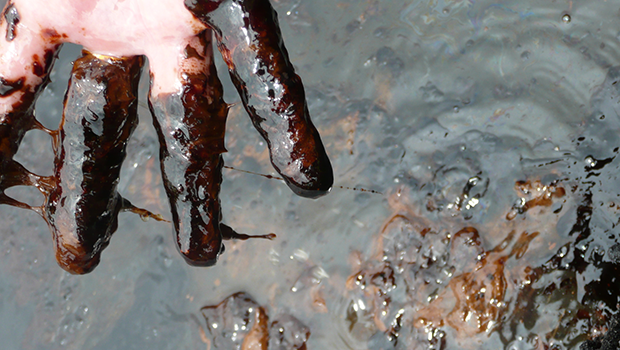- 17 Aug 2015
- [International Secretariat]
- Region: FEDERAL REPUBLIC OF NIGERIA
- Topic: Business and Human Rights

Shell must match the Nigerian government’s new commitment to tackle oil pollution in the Niger Delta by dramatically improving how it cleans up spills, Amnesty International said today.
President Muhammadu Buhari’s announcement on Wednesday of a trust fund to pay for the clean-up of the Ogoniland region in the Niger Delta is welcome, but if Shell’s ineffective clean-up methods are not fully overhauled, its impact will be limited.
“It is scandalous that Shell - which now wants the world to trust it to drill in the Arctic – has failed to properly implement the UN’s expert advice on oil spill response after so long,” said Mark Dummett, Amnesty International’s Researcher on Business and Human Rights, who has just returned from the Niger Delta.
“President Buhari’s initiative will fail, and the Ogoni people will continue to suffer, as long as Shell fails to make significant changes to the way it approaches oil spill clean-up.”
The establishment of the trust fund was a key recommendation of the United Nations Environment Programme (UNEP), which published a study on oil pollution in Ogoniland four years ago. The UNEP study also called for Shell’s clean-up methods to be urgently overhauled, including reviewing its methodology and addressing serious delays in responding to spills.
But researchers from Amnesty International investigating spill sites in the region have this month found oil on the soil and in nearby water bodies, in areas where Shell contractors are reported to have recently carried out remediation.
The fund will be overseen by representatives of the Ogoni people, the United Nations, the oil companies operating in Nigeria and the government itself. According to the government, “stakeholders” will pay an initial $10 million into the fund, but it is not clear who these stakeholders will be.
$10 million is far below the $1 billion that the UNEP said should be paid into the fund to cover the first five years of a clean-up job which could take up to 30 years. The UNEP study recommended that the contributions should be made by both the oil industry and the government.
“Ogoniland has been devastated by years of oil spills and Shell’s clean-up operations have been utterly ineffective,” said Mark Dummett.
“In 2011 UNEP highlighted numerous serious problems with the way Shell cleans up oil sites. But we have visited multiple sites and found oil pollution lying all around. From what we are seeing, little has changed since then.”
Background
A government press statement on Wednesday said that President Buhari “approved several actions to fast-track the long delayed implementation” of the UNEP report including the establishment of the fund.
The establishment of the fund was a key demand of Nigerian and international organizations, including Amnesty International, who wrote a joint letter to President Buhari requesting such action on 4 August 2015 four years after the UNEP’s report was published. https://www.amnesty.org/download/.../AFR4422192015ENGLISH.PDF
Shell was forced to leave Ogoniland in 1993, but its pipelines run through the area and it is responsible for leakages from these pipes.
Ogoniland is only one part of the Niger Delta that has been affected by oil pollution. Royal Dutch Shell and the Italian multinational oil giant ENI have admitted to more than 550 oil spills in the Niger Delta last year, according to an Amnesty International analysis of the companies’ latest figures. By contrast, on average, there were only 10 spills a year across the whole of Europe between 1971 and 2011.
AMNESTY INTERNATIONAL PRESS RELEASE
6 August 2015
Related Actions
- 22 Dec 2020
#ENDSARS: INVESTIGATE KILLINGS OF PROTESTORS - 13 Feb 2020
JOURNALISTMUST BE RELEASED - 6 Nov 2014
RELEASED AFTER 19 YEARS ON DEATH ROW [Suspended]
Related Newses
- 21 Jan 2020 [International Secretariat]
FEDERAL REPUBLIC OF NIGERIA: Rise in Cult Related killings in Rivers state - 13 Dec 2019 [International Secretariat]
FEDERAL REPUBLIC OF NIGERIA: Bills on hate speech and social media are dangerous attacks on freedom of expression - 25 Jun 2019 [International Secretariat]
FEDERAL REPUBLIC OF NIGERIA: Suicide bomb attacks killing at least 30 football fans bear hallmarks of Boko Haram - 31 May 2018 [International Secretariat]
FEDERAL REPUBLIC OF NIGERIA: Starving women raped by soldiers and militia who claim to be rescuing them - 22 Nov 2017 [International Secretariat]
FEDERAL REPUBLIC OF NIGERIA: Deadly mass forced evictions make life misery for waterfront communities




